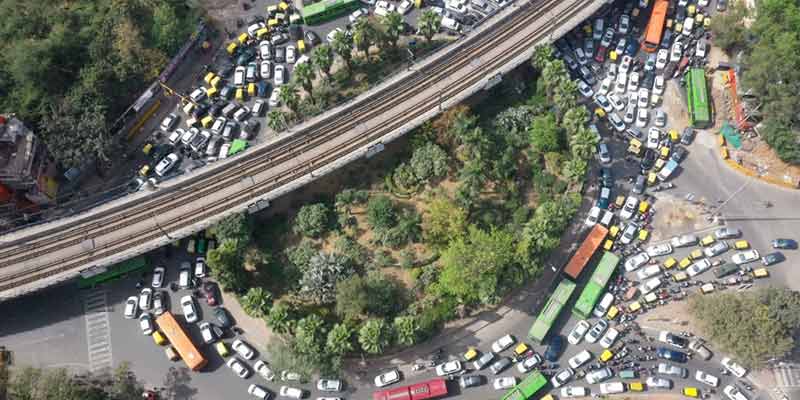- India
- Mar 23
Explainer / What is BS-VI emission standard?
• The Supreme Court permitted registration of BS-VI light and heavy diesel vehicles used for public utility and essential services.
• Bharat Stage (BS) emission standards are emission regulations implemented by the government to keep a check on emissions from motor vehicles.
• A bench of Justices directed that the authorities should not insist on production of court orders for the registration of vehicles in this category.
• The order was passed after perusing the report of advocate A.D.N. Rao, appointed as amicus curiae, who told the court BS-VI light and heavy diesel vehicles used for public utility and essential services may be permitted to be registered.
• The order was passed while hearing various pleas including the PIL filed by Environmentalist MC Mehta, seeking permission for registration of BS-VI diesel vehicles.
Auto Fuel Policy in India
• The rapid growth in automobile industry and the increasing number of vehicular population have become one of the major causes in the phenomenal rise of air pollution in India. Though air pollution is caused by several factors, the dramatic rise in the vehicular emissions has compounded the problem.
• Vehicular emission norms in India were first introduced in 1991 and tightened thereafter in 1996, when most vehicle manufacturers had to incorporate technology upgradation such as catalytic converter to reduce exhaust emission. This necessitated the use of lead free and low sulphur fuels.
• Fuel specifications based on environmental consideration were for the first time notified in the country by the environment ministry in April 1996 for achievement by 2000. These norms were incorporated in the BIS 2000 standards.
• Further, based on the Supreme Court order of April 1999, Ministry of Surface Transport (MoST) notified Bharat Stage-I (BIS 2000) and Bharat Stage-II vehicle emission norms broadly equivalent to Euro I and Euro II for introduction in entire India and NCR respectively.
• Against the backdrop of growing environmental concerns, the government constituted a committee of experts on September 13, 2001 under the chairmanship of Dr. R.A. Mashelkar, director general, Council of Scientific and Industrial Research (CSIR) to formulate an Auto Fuel Policy for the entire country including major polluted cities.
• Accordingly, National Auto Fuel Policy was laid down in 2003 to comprehensively address the issues of vehicular emissions and norms, automobile technologies, and also auto fuel quality in a cost efficient manner.
• In line with the Auto Fuel Policy (2003), starting from 2005, fuel conforming to Bharat Stage-III norms was introduced in 13 major cities, while Bharat Stage-II fuel was made available elsewhere in the country.
• From April 2010, Bharat Stage-IV petrol and diesel (50 ppm sulphur) was implemented in 13 major cities and Bharat Stage-III petrol (150 ppm sulphur) and diesel (350 ppm sulphur) was made available in rest of the country from September 2010.
• The Auto Fuel Policy, 2003 recommended periodic revisions in the policy to allow adjustments that may become inevitable in the light of technological changes at regular intervals. It was in this context, the government constituted an expert committee under the chairmanship of Saumitra Chaudhury, member, Planning Commission, on December 19, 2012 to review the Auto Fuel Policy of 2003.
• Accordingly, the expert committee drafted the report on Auto Fuel Vision and Policy, 2025 and submitted the same on May 2, 2014.
• The Saumitra Chaudhury Committee considered the call for “one country, one fuel”.
• The Committee recommended expansion of BS-IV fuel/emission norms in the entire country by April 1, 2017 and introduction of BS-V fuel/ emission norms across the country by April 1, 2020 and BS-VI norms by April 1, 2024.
• Keeping in mind the environmental impact, rising pollution levels and consequent health hazards, the government decided to switch over directly from BS-IV to BS-VI fuel standards from April 2020.
• Considering the rise in environmental pollution in Delhi and NCR, the government preponed the implementation of BS-VI norms with effect from April 1, 2018 in NCT-Delhi.
• In the transition to BS-VI fuels, BS-V norms have been skipped in order to have a more stringent standard at the earliest to curb pollution levels.
• In October 2019, the Supreme Court said that no BS-IV vehicle would be sold with effect from April 1, 2020.
Benefits of BS-VI fuel
• BS-VI fuels are ultra-clean, qualifying to stringent world-standard fuel quality parameters.
• BS-VI fuel reduces the NOx (nitrogen oxides) emission by 70 per cent in diesel cars, by 25 per cent in petrol cars and reduces particulate matter (PM) in vehicles by 80 per cent.
• The sulphur content in BS-VI fuels has been reduced to 10 ppm from 50 ppm in BS-IV fuels. The lower sulphur in the fuel will permit the use of advanced after-treatment devices (ATDs) used for reducing harmful exhaust emissions like carbon monoxide, hydrocarbon, NOx and particulate matter (PM).
• Moreover, sulphur reduction will reduce PM emissions even in the in-use older generation diesel vehicles.
• Hence, vehicles complying with BS-VI norms as compared to BS-IV norms would produce lower NOx emissions, lower PM emissions and lower hydrocarbon emissions. The poly-aromatic hydrocarbons (PAH) in diesel fuel have been reduced to 8 per cent in BS-VI compared to 11 per cent in BS-IV, thereby reducing carcinogenic emissions.
Manorama Yearbook app is now available on Google Play Store and iOS App Store


